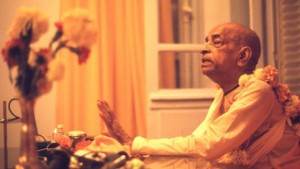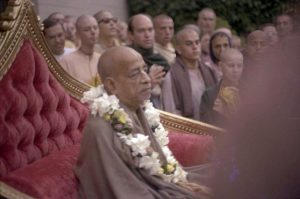When Prabhupada came to the west, so many devotees and others were confused and polluted by this impersonalism theory-its all one, you and I are god, etc, etc. This thinking pervaded peoples consciousness-especially among the younger generation. In this conversation he , sometimes with humor, invalidates these illusions and with logic establishes the Vedic conclusion-Krsna is God and we are all His parts and parcels.
Hare Krsna
damaghosa das
Sept 13 1`975 Vrndavnana
Dhṛṣṭaketu: They say when you become liberated then you become…, then you pervade everywhere. It’s just that… They say that just now, in this position…
Prabhupāda: So when you will be liberated? What is the standard of liberation?
Dhṛṣṭaketu: By performing austerities, by studying the…
Prabhupāda: That’s all right. What is the standard?
Dhṛṣṭaketu: When I merge, when I lose my identity, when I don’t…
Prabhupāda: That means you forget. You forget everything. Then how you will be liberated? Whatever little consciousness was there, that is finished. Then how you become liberated? Whatever you had, that is also finished. Eh? Then how you become liberated?
Harikeśa: But what we are forgetting is just illusion anyway.
Prabhupāda: That is liberation. Then I kill you, you forget everything—liberation. (laughter) What is the meaning of liberation? They do not know even the meaning of liberation.
Harikeśa: To get rid of all these miseries.
Prabhupāda: That you can do. I can kill you; you get rid of all miseries. Finished. You are finished; your miseries are finished. That’s all.
Brahmānanda: It doesn’t matter whether you live or you die because it is all one.
Prabhupāda: Well, let me kill you. That’s all right. It will be great beneficial to you.
Indian man (1): To my opinion, we are more liberated in… (indistinct).
Prabhupāda: Your opinion, my opinion. We have to consider the fact. (Vraja-vasi passes by, singing) This is jīvan ko sabadiya tomara. This is surrender, that he is singing, jīvan ko sabadiya: “When I surrender unto Your lotus feet.” That is surrender. This is liberation. Just like the child fully surrendered to the parent, he is liberated. He has no anxiety. He is confident “My parents are there. Whatever he’ll do, that’s all right for me.” That is liberation.
Indian man (1): We can become free from all anxieties.
Prabhupāda: Yes, that is liberation. If you are filled up with anxieties where is your liberation? That is not liberation.
Dhṛṣṭaketu: They will also say that this condition of being one with the Supreme is also…
Prabhupāda: How you become one? If Kṛṣṇa or the consciousness is there but you lose your consciousness, why you become one?
Harikeśa: Well, it’s not exactly that we lose consciousness but we merge into the supreme consciousness.
Prabhupāda: Supreme consciousness?
Harikeśa: Then we become God.
Prabhupāda: No. You cannot. Then why you are different now?
Harikeśa: It’s my līlā. (laughter)
Prabhupāda: Then if it is līlā, then why you are undergoing austerity? That is also līlā. If it is līlā, then why you are trying to get out of it by practicing austerity?
Harikeśa: Mahārāja Ṛṣabhadeva performed austerity.
Prabhupāda: Hm?
Harikeśa: Ṛṣabhadeva, he performed austerity.
Prabhupāda: No, what…? I do not follow what you say.
Brahmānanda: He’s saying that Ṛṣabhadeva performed austerity, so therefore I am performing austerity.
Prabhupāda: You are performing but what is Ṛṣabhadeva’s position?
Brahmānanda: He never claimed to merge with the supreme consciousness.
Dhanañjaya: But the whole thing is that the supreme consciousness is unembodied and we are embodied right now. So when we attain supreme consciousness we also become unembodied.
Prabhupāda: How you become embodied if you are supreme? Who made you embodied if you are supreme? Then who made you embodied, he is supreme. You are not supreme. You did not like to be embodied; therefore you are trying to be bodyless. But who made you embodied? Then that he or she is supreme. You are not supreme.
Dhṛṣṭaketu: I put myself in this condition so that I can enjoy getting out of it.
Prabhupāda: Huh?
Dhṛṣṭaketu: I put myself in this condition of illusion so that I can enjoy being liberated.
Prabhupāda: And so you put yourself to be kicked by me and enjoy. Just test what is the enjoyment of being kicked.
Dhanañjaya: But without pain how can you experience pleasure?
Prabhupāda: You get this experience, how it is pleasure? I kick and you enjoy?
Dhṛṣṭaketu: The idea is that after experiencing the suffering of this material world then liberation will be very…
Prabhupāda: Why there is suffering, material? You are supreme; why it is suffering for you?
Dhṛṣṭaketu: Well, so that when I…
Prabhupāda: So, there is no “so that.” Why you are suffering?
Brahmānanda: It’s suffering only for those…
Prabhupāda: If it is your līlā, then you are suffering. What is this nonsense of “my līlā.” Suffering?
Brahmānanda: The suffering is only for those who haven’t…, who don’t understand that they are supreme.
Prabhupāda: Hm?
Brahmānanda: Those who don’t understand, they are the ones who suffer, but I don’t suffer.
Prabhupāda: So it is better to remain in that ignorance. Just like the hogs and dogs, they do not understand that this is suffering. But we can understand that this is suffering.
Brahmānanda: Yes. To be a dog, that’s all right because the dog doesn’t suffer. He is enjoying.
Prabhupāda: No, no, why you are doing austerity? Remain as dog and cat. Therefore you are mūḍha. You do not know what is suffering, what is enjoyment. Mūḍho nābhijānāti mam ebhyaḥ param avyayam. Therefore one who is intelligent, jñāni, bahūnām jan… After suffering in this way and talking all nonsense, when he comes to the real knowledge, then he surrenders. Bahūnāṁ janmanām ante jñānavān maṁ prapadyate [Bg. 7.19]. That is knowledge.
Indian man (1): Kamādinaṁ katīna katidha palita durnideśaḥ.
Prabhupāda: Ah. When he comes to this awareness, that “I have simply suffered and I wanted to maintain myself by jugglery of words,” then he comes to the real knowledge.
Dhṛṣṭaketu: So the Māyāvādīs’ philosophy is actually the supreme illusion.
Prabhupāda: Yes. Therefore Caitanya Mahāprabhu has forbidden. Māyāvādī-bhāṣya sunile haya sarva nasa [Cc. Madhya 6.169]. One is finished if he follows the Māyāvāda philosophy. He is doomed. He will never be able to accept the real philosophy. He will be absorbed in that false philosophy. This is Māyāvādī’s position. Māyāvādī haya kṛṣṇe aparādhī. They are aparādhī, offender. Therefore they shall remain perpetually in ignorance and think himself, “I am God.” This is Māyāvādī’s position. Vivekānanda preached openly that “Why you are thinking that you are sinful? You are God.” He preached like that.
Brahmānanda: The Christians, they have a concept of sin. So when Vivekānanda went to America he was telling them, “No, you forget this concept. Whatever you do, it’s all right because you are God.” They were surprised.
Prabhupāda: Yes.
Gopāla Kṛṣṇa: That’s why they liked him.
Prabhupāda: No, no. They did not like. The Christian priests did not like him. They condemned him, “Oh, you are come from India, and you are speaking nonsense, this?” In those hundred years the Christian priests were conscious: “But how is this? From India he has come and he’s talking like nonsense?” They questioned in Chicago speech.
Dhṛṣṭaketu: He’s just fanning the fires of atheism.
Prabhupāda: Yes.
Harikeśa: This Māyāvādī philosophy, is this…?
Prabhupāda: They are atheist. They are first-class atheist, more than the Buddhist. Veda na maniya bauddha haila nāstika. The Buddhists, they did not accept Vedic authorities; therefore they are considered as nāstika. But vedāśraya nāstikya vada. These rascals, they accept Vedas and preaches atheism. So they are more dangerous than the Buddhists. This is Caitanya Mahāprabhu’s version. (aside) Hare Kṛṣṇa. Bauddha ke adhika: “They are more dangerous than the Buddhists.” The Buddhists, although they are supposed to be atheists, they worship the Deity Lord Buddha. But they say it is māyā. And more advanced than these atheists.
Brahmānanda: The Māyāvādīs.
Prabhupāda: More… Not advanced. More degraded. These atheists, they have been taught to worship the form of Lord Buddha, and Buddha is incarnation of Kṛṣṇa, so one day they will be delivered. But these rascals will never be delivered.
Pṛthu-putra: I read in one of your books so many names about different groups of these Māyāvādī philosophers. Are they still existing today and active?
Prabhupāda: Yes. Anyone who thinks godlessness, he is Māyāvādī, that’s all. Anyone. All these impersonalists, they are all Māyāvādīs. And mostly they are now impersonalists.
Dhṛṣṭaketu: So although we can’t see it with our material eyes, their position is very precarious.
Prabhupāda: We have no eyes to see. We see through Kṛṣṇa. As Kṛṣṇa sees, we see. This is Kṛṣṇa conscious. We are not perfect. Our position is that we are not perfect. But we are perfect so long we follow Kṛṣṇa, that’s all. Just like I am blind man. I am not perfect. But if you have got eyes, if you take me I follow you. Then I am perfect. Kṛṣṇa assures that “You surrender to Me and I will make you free from all dangers,” and we accept Kṛṣṇa. That’s all. Our method is very easy. The child is walking, unable to walk, falling down. The parents say, father says, “My dear child, just catch my hand.” Then he’s safe. These Māyāvādīs, they go against the verdict of God. God says that “The living entities are My part and parcel,” and they say, “I am God.” So that is their foolishness. Part and parcel… Kṛṣṇa says, mamaivaṁso jīva-bhutaḥ [Bg. 15.7]. Otherwise why God says, “Surrender unto Me,” if you are equal with Him? Why God is asking, “Surrender unto Me”? You are not equal. You are rascal. You are claiming that “I am equal.” Otherwise there is no question of surrender. “You surrender unto Me.” And this knowledge of surrender comes, Kṛṣṇa says, bahūnāṁ janmanām: “This rascal is always thinking ‘I am God, God, God.’ This rascaldom is finished after many, many births, this ignorance.” Then he surrenders. How the living entity is equal with God?


